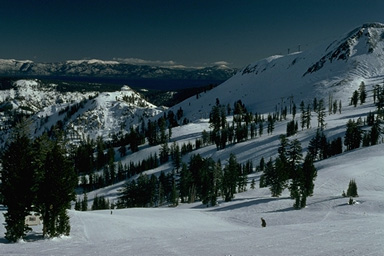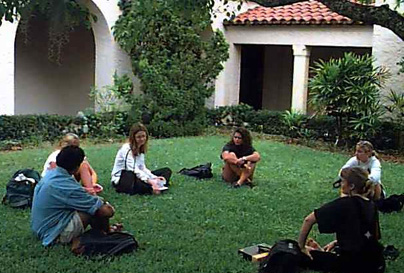Are we a mature society?
"But likewise, and obviously, many resources should be free. The right to criticize a government official is a resource that is not, and should not be, controlled. I shouldn’t need the permission of the Einstein estate before I test his theory against newly discovered data. These resources and others gain value by being kept free rather than controlled. A mature society realizes that value by protecting such resources from both private and public control."
Lawrence Lessig, The Future of Ideas, p. 14.
The Future of Ideas
"The argument of this book is that always and everywhere, free resources have been crucial to innovation and creativity; that without them, creativity is crippled. Thus, and especially in the digital age, the central question becomes not whether government or the market should control a resource, but whether a resource should be controlled at all. Just because control is possible, it doesn’t follow that it is justified. Instead, in a free society, the burden of justification should fall on him who would defend systems of control.
Ibid. , p. 14.
What is a commons?
This is not a new question, though we’ve been well trained to ignore it. Free resources have always been central to innovation, creativity, and democracy the businesses around them. Central Park is free in the sense I mean; it gives value to the city that it centers. A jazz musician draws freely upon the chord sequence of a popular song to create a new improvisation, which, if popular, will itself be used by others. Scientists plotting an orbit of a space-craft draw freely upon the equations developed by Kepler and Newton and modified by Einstein. Inventor Mitch Kapor drew freely upon the idea of a spreadsheet—VisiCalc—to build the first killer application for the IBM PC—Lotus 1-2-3. In all of these cases, the availability of a resource that remains outside the exclusive control of someone else—whether a government or a private individual—has been central to progress in science and the arts. It will also remain central to progress in the future.
Yet lurking in the background of our collective thought is a hunch that free resources are somehow inferior. That nothing is valuable that isn’t restricted. That we shouldn’t want, as Groucho Marx might put it, any resource that would willingly have us. As Yale professor Carol Rose writes, our view is that “the whole world is best managed when divided among private owners,”14 so we proceed as quickly as we can to divide all resources among private owners so as to better manage the world.
.
The Future of Ideas, p. 13-14.

| Internet Search Tools: | |
| By 2004, nearly three quarters of all middle and high school students used the internet as their initial source for research, according to a recent Newsweek, analysis. * |
PC: the personal computer. |
|
About searching on the internet. Below are listed five leading Internet search engines for you to use, or book mark. In addition there are web sites you can trust and should use when writing papers. How to cite web sources. |
This PC device substantially altered how people learn and work to produce documents, images and mixed media.
Google searches over six billion web pages, discussion groups, & images.
Ask Jeeves not as good with common names
Yahoo when searching for specific phrases or names use quotation marks: "Tamil Tigers"
MSN Search compared to what Microsoft has done, this remains a less than optimal performer
Topix.net searches 4,000 on-line news sources.

Research sites | nature home | technology home | Non Governmental Organizations
Dictionary | Vocabulary | Advanced Vocabulary | Words | fact vs fiction | Rare words | theme vs thesis | antonyms | dialectic | obscure words
Science Index | Population Index | Genetics Index | Global Warming Index | Nature Index | Site Analysis | Brief
Authors: a partial listing of with links to authorities used, quoted, and sited on this web site.
Snow Crystals -- there are no two snow flakes that are exactly the same.
Vocabulary one of many pages devoted to
words you need to know for success in the class.
Metaphors are crucial to use and interpret in your writing.
Body of knowledge, such as: ecology, history, bio-history, biology, economics, science.
Methods are the means we have to test our assumptions.
A new grammar for our experiences may be necessary to develop?
Carbon as a new currency for our postindustrial world?
The United States Bureau of the Census.
Technology as politics.
Museums
When writing: always consider | Writing Criteria: listed as a form | Free writing | Writing from texts
- Union of Concerned Scientists
- Sierra Club
- National Audubon Society
- Wilderness Society
- National Wildlife Federation
- World Wildlife Fund (WWF-US)
- Save the Manatee Club
- Environmental Defense (ED)
- Natural Resources Defense Council (NRDC)
- League of Conservation Voters (LCV)
- Public Interest Research Group (PIRG)
- National Environmental Trust (NET)
- National Parks, and Conservation Association (NPCA)
- North American Association for Environmental Education
- Greenpeace
- Isaac Walton League
- Defenders of Wildlife
- American Littoral Society
- Environmental Working Group
- ICLEI: International Council for Local Environmental Initiatives

NGOs, non-governmental organizations:
Alphabetical guide to the site Where next? | Research sites | nature home | technology home | Non Governmental Organizations Words used

| Class participants go here | |
Some steps to doing well in classes: |
|
Short essays on this web site as examples for your assignments.Service Learning opportunitiesSite at a glance |
Rollins College Chapel; Garden in a private quad in Florida. [ J. Siry, 1992] |
* "Next Frontiers," Newsweek, March 29, 2004, p. 54.

Search the Internet an easy way
American Academy for the Advancement of Science, AAAS: Atlas.
American Museum of Natural History (New York)
Boston Athenaeum
Inside the Environmental Protection Agency, EPA.
US Geological Survey, USGS.
University of California, Library.
University of Texas, Library.
National Public Radio, NPR.
Research Facilities in Museums on the web.
Environmental topics portal for the web.
Environmental Media Services, EMS, daily update of news.
MET Office: Hadley Climate Centre in UK has recent press releases.
Foreign Press sampling.
US Census Bureau (decennial census data)
White paper (example)

Created -- January 21, 2008.




